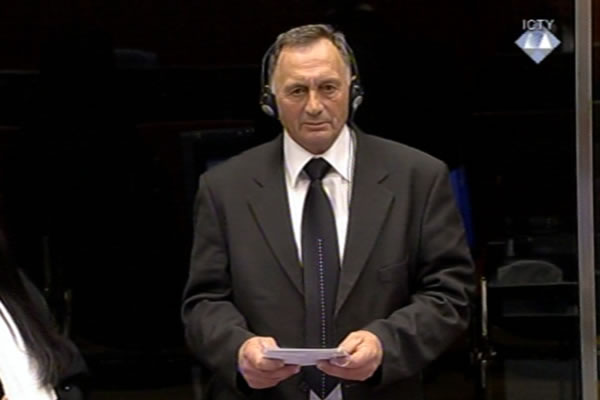Home
KARADZIC’S ‘GOOD COP’
With the evidence of Dragomir Obradovic, former commander of the Sokolac police station, Karadzic tried to corroborate his well-known arguments about the Serb police’s protective role and the voluntary departure of the Muslim population. Karadzic also wanted to bolster his argument about his own peace efforts
 Dragomir Obradovic, defence witness of Radovan Karadzic
Dragomir Obradovic, defence witness of Radovan Karadzic In his statement to Radovan Karadzic’s defense, former police officer from Sokolac Dragomir Obradovic claimed that the police did everything to guarantee safety to the people in the municipality. Peace was kept for four months after the beginning of the conflict, the witness insisted. There would have been peace until the end of the war if Muslims ‘didn’t start killing people in the outlying parts of the municipality’, the witness recounted.
‘The blood of men is monstrous nourishment’, the witness quoted from the poem Mountain Wreath, arguing that the first crimes were a ‘primer’ for the conflicts that led to the ‘escalation of violence’. Local Serbs wanted the police to disarm Muslims in some villages. When the police arrived in the villages of Mangurici, Sahbegovici and Meljine, the population had already ‘voluntarily’ left the area.
In a bid to prove there were no expulsions, the witness used the example of the village of Vrhbarje. The population there, the witness claimed, ‘lived in peace… worked side by side and everybody looked after each other’ until October 1994. Then the ‘people got on the buses and left’, the witness said, adding that ‘both Serbs and Muslims cried’ at the parting.
In the cross-examination, the prosecutor argued that more than 60 villagers of Vrhbarje didn’t go to Sarajevo voluntarily. On the contrary, they were evicted, placed under police escort and taken to the prison in Kula. The witness at first bent over backwards to deny that the police were involved in the forcible removal of the population, but finally said that the public security station personnel did escort the buses to ‘the town of Kula where there is a prison’. The witness didn’t know what happened later with the prisoners, but he soon sought to correct his evidence, saying that the villagers were taken to Kula to be exchanged. In the re-examination, it emerged that ‘those who were exchanged’ in fact called him to thank him ‘because they were not abused’.
In his statement to the defense, Obradovic didn’t contest the murder of about 40 boys, men and elderly people in the village of Novoseoce. This incident is listed in the indictment. Obradovic, nevertheless, denied that the police were involved and that the local authorities knew about it. Obradovic claimed that the soldiers committed the crime while the police and the civilian authorities ‘condemned the act’. In Obradovic’s words, the crime was a ‘stain on Sokolac’. The police ‘didn’t interfere in the investigation’ because the crime was under the military jurisdiction, the witness explained, adding ‘if the servicemen cause problems, the army must intervene’.
At the end of his testimony, Obradovic remembered a meeting in the Sokolac municipality where Karadzic ‘urged the people to live together’, insisting that ‘you cannot exterminate an ethnic community in an area’ and that ‘Muslims should be given all basic foodstuffs and be protected on the ground so that they can live and work normally’.
In the end, Karadzic thanked Obradovic and commended him, saying he was a ‘good police officer’.
Linked Reports
- Case : Karadzic
- 2013-03-25 BOZIDAR VUCUREVIC – ‘PROTECTOR’ OF TREBINJE MUSLIMS
- 2013-03-22 TRUTH AND UNTRUTH ABOUT SREBRENICA
- 2013-03-22 APPELLATE HEARING FOR KARADZIC JUDGMENT ON 17 APRIL 2013
- 2013-03-27 THE WITNESS WHO DIDN’T SEE ANYTHING
- 2013-03-28 STEALING VW GOLF CARS MORE IMPORTANT THAN CRIMES AGAINST CIVILIANS
- 2013-04-02 RADOVAN KARADZIC WAS A ‘SUPERIOR BUT VULGAR INTELLECTUAL’
